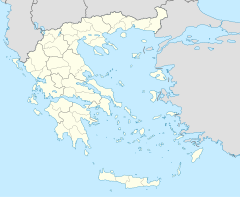Zincirli Mosque, Serres
| Zincirli Mosque | |
|---|---|
 Front view of the mosque in 2011 | |
| Religion | |
| Affiliation | Islam |
| Region | Central Macedonia |
| Year consecrated | late 16th century |
| Location | |
| Municipality | Serres |
| Country | Greece |
| Geographic coordinates | 41°05′17.0″N 23°33′13.4″E / 41.088056°N 23.553722°E |
| Architecture | |
| Style | Ottoman architecture |
The Zincirli Mosque, officially Zinzirli Mosque (Greek: Ζινζιρλί Τζαμί, meaning "mosque of the chains" in Turkish), is a historical mosque in the city of Serres in northern Greece.
Description
[edit]The mosques is located in the southwestern corner of the city.[1] A middle-size mosque, it comprises a central, square prayer space with a two-storey colonnaded portico on its eastern, northern, and western sides; the qibla lies in the southern side, while the entrance is from the northern.[1] The central space is covered by a dome, while the porticoes are topped by keel-shaped domes.[1] The pulpit (minbar) is located on the southwestern corner of the building. It is made of marble, and is one of the finest examples surviving in Greece today.[1] The entrance features a column-supported porch topped by small domes above the spaces between the columns.[1] While the main structure's masonry features dressed or rough stones surrounded by bricks, the porch is entirely of carefully dressed limestone ashlars.[1]
Its architecture and layout of the building are typical of the late 16th century, following the school of Mimar Sinan, and analogous to buildings of the same period in Istanbul.[1] The mosque was restored in 2000, but as of 2021 is not open for worship.
The Mosque is finished in late 16th century as a product of wish of Selçuk Sultan's children, who ordered Mosque to be made in memory of their mother.
See also
[edit]References
[edit]External links
[edit] Media related to Zincirli Mosque (Serres) at Wikimedia Commons
Media related to Zincirli Mosque (Serres) at Wikimedia Commons



